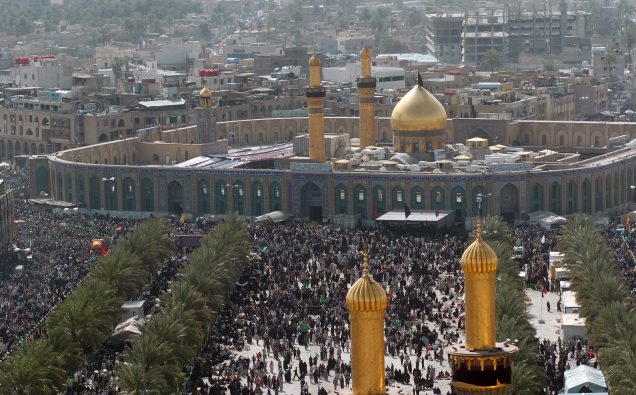
The conflict between good and evil has been going on from times immemorial, and history is replete with sacrifice of life, limb and worldly possessions by a multitude of devout people of different persuasions, to uphold truth, peace and justice. However, the massacre of Imam Hussain, the grandson of Prophet Muhammed, Peace Be Upon Him, and his small band of 72 followers in Karbala, Iraq, almost 1400 years ago, by the Yazidi tyrannical force – numbering according to some accounts somewhere between 40,000 and 80,000 – has no parallel in the recorded human history.
I am neither a religious scholar, nor a political scientist, but a student of history. Throughout my life I have been observing the solemn occasion of Muharram commemorating the tragedy of Karbala for the past 80 years, since my very childhood. The mission of Imam Hussein to offer supreme sacrifice, almost 1400 years ago was to uphold dignity, peace, truth and justice, and preserve the true teachings of Islam, as preached by the Holy Prophet during his lifetime. It was to unite the Muslim Ummah under one flag of righteousness!
For millions of Muslims, the first month of the Islamic (Lunar) calendar brings with it deep sorrow and anguish and the devote the first ten (10) days to commemorate the supreme sacrifice of Imam Hussain, the grandson of Prophet Muhammad (PBUH), who opted steadfast adherence to values of justice, truth, well-being of all and fairness over the oath of allegiance to Yazid, a tyrant, who became the self-styled Caliph of Islam, upon the death of his father, Emir Moawia, Governor of the Islamic State of Syria. Accounts of history tell us that Yazid flouted tenets of Islam and as preached by the Prophet himself during his lifetime.
On the 10th of Muharram, 61 Hijra, (680 CE), Imam Hussain laid down his life, as a supreme sacrifice, along with his loved ones. The male members of his family and young children, including his faithful followers, also demonstrated the highest level of courage, valor and steadfastness, unparalleled in human history, against a vicious enemy, a thousand times larger. This epic tragedy took place on the plains of Karbala, present day Iraq, on the bank of the Euphrates River and has shaken the conscience of the Muslim world to its core.
The only male member left alive was the Imam’s adolescent son, who lay unconscious in a tent, running high fever, and was dehydrated for lack of water for three days in the scorching heat.
Since then, historians, writers and poets in Eastern and Western societies have revered and written extensively about this heart-wrenching tragedy inflicted upon the family of the Prophet. Here is how some of the renowned Sunni poets have paid tributes to the Imam for his steadfastness and sacrifice.
A tribute in Urdu by Mauala Zafar Ali Khan, a renowned Sunni poet of the Indian Subcontinent – “Ae Karbala ki khaaq, tu is ehsan ko na bhoo/Tarpi he tujh peh lash gigar goshae Rasool
Islam ke lahoo se teri pias bujh gai/Sairab kar gia thje khoone raggi Batool
Karti rahe gi pesh shahadat Husain ki/Unwanie hahayat ka yeh sarmaddi asool.”
Translation:
O land of Karbala! Never forget the favor,
That the Prophet’s grandchild’s body lay dismembered;
And his blood flowed on your barren surface to quench your thirst,
By sucking the blood (essence) of Islam – The blood of Imam Hussain,
Enshrined in the Prophet’s daughter, (Imam’s mother),
The martyrdom of Hussain will serve for eternity,
A principle to uphold peace and justice
A homage to Imam Hussain in Persian language by Khawaja Moinuddin Chishti, a renowned Sunni Sufi of the Chistia Order of the Indian Subcontinent, who’s Mausoleum in Agra, India is a venue each year by Muslims of all schools of thoughts, and Non-Muslims alike, is highly regarded.
“Shah hast Hussain
Baadshah Hast Hussain
Sar daad, Na daad dast dar dasti Yazid
Haqqa keh binai La Illah hast Hussein”
Translation –
Hussain is the king
Hussain is the emperor
He sacrificed his life, but did not give his hand in allegiance to Yazid (a tyrant)
Lo Hussein is the (true) essence of God’s unity.
Allama Iqbal, a preeminent poet in both Persian and Urdu languages and one of the most influential thinkers in modern Islamic history, paid homage to Imam Hussain eloquently and profoundly in many of his verses. Imam Hussain’s example is one of the major themes resonating in his works.
Here are a few couplets:
“Islam ke daaman main bus iss ke siwaa kia hai,
Ik Zarb-e-Yadullahhi, ik sajada-e-Shabbiri
“Islam has nothing else in its bosom to offer, except:
In self-defense, a stroke of sword by the Hand of God (Ali);
As well as prostration by Shabbir (Hussain),
While he was assassinated with a dagger at Karbala
“Gharib-o-saada hai daastaan-e-Harram,
Nihayat is ski Hussain, Ibtidaa Ismail
“The story of Kaaba is poor, simple but colorful,
It starts with Ishmael and ends with Hussain
“Agar Sar-e-Hussain ki tafseer ho jai,
Musalmaano ka Kaaba roaza-e-Shabbir ho jai
“If the true cause of the decapitation of Hussain head (at Karbala) is brought to light,
The Mausoleum of Shabbir (Hussain) could become synonymous with Kaaba
In conclusion, it is my ardent hope and desire that the supreme sacrifice offered by Imam Husain, almost 1400 years ago, will act as a beacon and continue to resonate with the masses, regardless of their cultural, political, and religious persuasions, to uphold truth and justice for all, and his message will serve as a model for peaceful co-existence, human dignity and belief in values of justice and fair play.
“Insaan ko bedaar to ho lene do,
Har qaum pukaari gi hamaare hain Hussain”
Let human consciousness be fully awake,
Every nation would lay a claim that Hussain belongs to them.”
This opinion piece has been partly derived from the author’s book ‘Imam Hussain – Journey to the Valley of Death.’
















